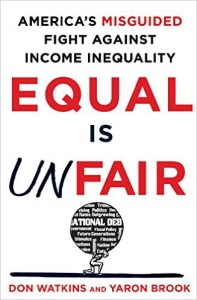 I recently finished reading Equal is Unfair: America’s Misguided War Against Income Inequality by Don Watkins and Yaron Brook and a quote from chapter 5, The War on Opportunity, stood out to me and yesterday, while listening to the book on Audible, that same quote jumped out at me again. The quote is from remarks made by President Obama about economic mobility. As quoted in the book:
I recently finished reading Equal is Unfair: America’s Misguided War Against Income Inequality by Don Watkins and Yaron Brook and a quote from chapter 5, The War on Opportunity, stood out to me and yesterday, while listening to the book on Audible, that same quote jumped out at me again. The quote is from remarks made by President Obama about economic mobility. As quoted in the book:
[W]e were convinced that America is a place where even if you’re born with nothing, with a little hard work you can improve your own situation over time and build something better to leave your kids….The problem is that alongside increased inequality we’ve seen diminished levels of upward mobility in recent years.
The book does a great job of disputing the claim about upward mobility, so I won’t go into that here. What came to my mind on reading, and hearing, that quote was another from President Obama, his (in)famous “you didn’t build that” speech. He said:
If you were successful, somebody along the line gave you some help. There was a great teacher somewhere in your life. Somebody helped to create this unbelievable American system that we have that allowed you to thrive. Somebody invested in roads and bridges. If you’ve got a business — you didn’t build that. Somebody else made that happen.
My first impression when I began thinking about these two quotes was that there was some contradiction here. After all, from one quote to the next he appears to go from “you didn’t (and can’t) build it” to “we were convinced you could build it,” an obvious contradiction. The more I thought about them however, the more I came to see that they are actually expressing the same idea: a war on success, the successful and even on the opportunity to succeed.
We must begin to celebrate successes, great and small, and realize that each man’s success, far from harming us, makes our lives better and brings greater opportunities for our own success.
In the first quote given above, he claims that those who have been successful are making it harder for everyone else to improve their lot in life. The second claims that if you succeed, sure you might have shown some initiative but it was really “society” that made it all possible. The implication is that if you succeed, it isn’t really because of your own efforts and, in any event, the more successful you become the more difficult you will be making it for the next person. In essence, the President is saying, “Sure, we don’t begrudge your success, but don’t get too successful. How much success is too much? Well, you’ll know when you get there because we’ll start punishing you, economically and morally, for it.”
How long can this country survive when the political and intellectual leaders are telling us that success is harmful and are ready to harm us if we dare to succeed? How long will people even try to succeed when the just profits for their work will be taken from them by force? How long would you continue to strive for success if your reward is to be morally condemned as a greedy exploiter?
The whole idea that one person’s success harms others is simply nonsense. Did Bill Gates’ success in building Microsoft, achieved by creating products people wanted to buy, make it more difficult for other people to succeed? Do fewer people or more have the opportunity to make a living as a programmer since Steve Jobs created the smart phone revolution by developing the iPhone? Did Jeff Bezos creating Amazon, and making billions in the process, make it more or less difficult for authors to become successful?
If we really wanted to make America great again, to borrow a phrase, we could take no better first step than to discard the culture of envy this war on success represents. We must begin to celebrate successes, great and small. We need to acknowledge that each man’s success, far from harming us, makes our lives better and brings greater opportunities for our own success.
